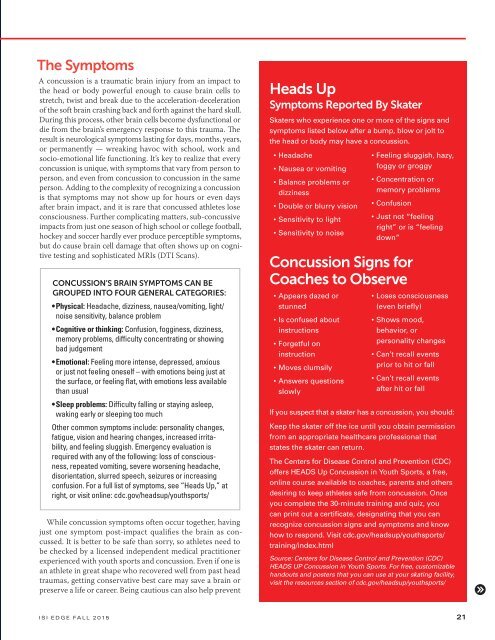Concussion Awareness
1PRs4kt
1PRs4kt
You also want an ePaper? Increase the reach of your titles
YUMPU automatically turns print PDFs into web optimized ePapers that Google loves.
The Symptoms<br />
A concussion is a traumatic brain injury from an impact to<br />
the head or body powerful enough to cause brain cells to<br />
stretch, twist and break due to the acceleration-deceleration<br />
of the soft brain crashing back and forth against the hard skull.<br />
During this process, other brain cells become dysfunctional or<br />
die from the brain’s emergency response to this trauma. The<br />
result is neurological symptoms lasting for days, months, years,<br />
or permanently — wreaking havoc with school, work and<br />
socio-emotional life functioning. It’s key to realize that every<br />
concussion is unique, with symptoms that vary from person to<br />
person, and even from concussion to concussion in the same<br />
person. Adding to the complexity of recognizing a concussion<br />
is that symptoms may not show up for hours or even days<br />
after brain impact, and it is rare that concussed athletes lose<br />
consciousness. Further complicating matters, sub-concussive<br />
impacts from just one season of high school or college football,<br />
hockey and soccer hardly ever produce perceptible symptoms,<br />
but do cause brain cell damage that often shows up on cognitive<br />
testing and sophisticated MRIs (DTI Scans).<br />
CONCUSSION’S BRAIN SYMPTOMS CAN BE<br />
GROUPED INTO FOUR GENERAL CATEGORIES:<br />
• Physical: Headache, dizziness, nausea/vomiting, light/<br />
noise sensitivity, balance problem<br />
• Cognitive or thinking: Confusion, fogginess, dizziness,<br />
memory problems, difficulty concentrating or showing<br />
bad judgement<br />
• Emotional: Feeling more intense, depressed, anxious<br />
or just not feeling oneself – with emotions being just at<br />
the surface, or feeling flat, with emotions less available<br />
than usual<br />
• Sleep problems: Difficulty falling or staying asleep,<br />
waking early or sleeping too much<br />
Other common symptoms include: personality changes,<br />
fatigue, vision and hearing changes, increased irritability,<br />
and feeling sluggish. Emergency evaluation is<br />
required with any of the following: loss of consciousness,<br />
repeated vomiting, severe worsening headache,<br />
disorientation, slurred speech, seizures or increasing<br />
confusion. For a full list of symptoms, see “Heads Up,” at<br />
right, or visit online: cdc.gov/headsup/youthsports/<br />
While concussion symptoms often occur together, having<br />
just one symptom post-impact qualifies the brain as concussed.<br />
It is better to be safe than sorry, so athletes need to<br />
be checked by a licensed independent medical practitioner<br />
experienced with youth sports and concussion. Even if one is<br />
an athlete in great shape who recovered well from past head<br />
traumas, getting conservative best care may save a brain or<br />
preserve a life or career. Being cautious can also help prevent<br />
Heads Up<br />
Symptoms Reported By Skater<br />
Skaters who experience one or more of the signs and<br />
symptoms listed below after a bump, blow or jolt to<br />
the head or body may have a concussion.<br />
• Headache<br />
• Nausea or vomiting<br />
• Balance problems or<br />
dizziness<br />
• Double or blurry vision<br />
• Sensitivity to light<br />
• Sensitivity to noise<br />
• Feeling sluggish, hazy,<br />
foggy or groggy<br />
• Concentration or<br />
memory problems<br />
• Confusion<br />
• Just not “feeling<br />
right” or is “feeling<br />
down”<br />
<strong>Concussion</strong> Signs for<br />
Coaches to Observe<br />
• Appears dazed or<br />
stunned<br />
• Is confused about<br />
instructions<br />
• Forgetful on<br />
instruction<br />
• Moves clumsily<br />
• Answers questions<br />
slowly<br />
• Loses consciousness<br />
(even briefly)<br />
• Shows mood,<br />
behavior, or<br />
personality changes<br />
• Can’t recall events<br />
prior to hit or fall<br />
• Can’t recall events<br />
after hit or fall<br />
If you suspect that a skater has a concussion, you should:<br />
Keep the skater off the ice until you obtain permission<br />
from an appropriate healthcare professional that<br />
states the skater can return.<br />
The Centers for Disease Control and Prevention (CDC)<br />
offers HEADS Up <strong>Concussion</strong> in Youth Sports, a free,<br />
online course available to coaches, parents and others<br />
desiring to keep athletes safe from concussion. Once<br />
you complete the 30-minute training and quiz, you<br />
can print out a certificate, designating that you can<br />
recognize concussion signs and symptoms and know<br />
how to respond. Visit cdc.gov/headsup/youthsports/<br />
training/index.html<br />
Source: Centers for Disease Control and Prevention (CDC)<br />
HEADS UP <strong>Concussion</strong> in Youth Sports. For free, customizable<br />
handouts and posters that you can use at your skating facility,<br />
visit the resources section of cdc.gov/headsup/youthsports/<br />
ISI EDGE FALL 2015 21


